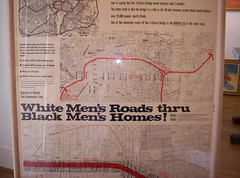Emergency Committee on the Transportation Crisis
If you ever poke around the materials at Washingtoniana, the special collection at the DC Public Library main branch, you'll come across one of the huge (they are at least four feet tall) posters from this 1960s-1970s anti-freeway advocacy group.
I didn't know that there were other similarly large posters. This one was being dropped off so that a transparency can be made and the poster reproduced, and I happened to be there serendipitously. The poster belonged to Floyd Agostinelli, one of the organizers of ECTC, which had one of its main organizing centers in Brookland.
I haven't read as much of the work from back then as I'd like, but I find it interesting that Zach Schrag's book The Great Society Subway is somewhat dismissive of this movement.
It was interesting to talk with Paula Agostinelli for a moment. She recounted being in a demonstration with her brothers and sisters, marching along South Dakota Avenue, amongst the only white kids in the march. She talked about the DC councilmembers who "sold out" -- listed on the poster -- and a whole lot more.
I think that academics (and sometimes all of us) have a difficult time recognizing that you need different advocacy "pushes" in a campaign, and that not all of these pushes come from the same group. E.g., the "outlandish" position serves as a useful backdrop when negotiating--"look, we are getting a lot of pressure from this end of the coalition, and they won't be satisfied with what (this relative crumb) you're offering..."
This is something I learned at the Center for Science in the Public Interest, a health advocacy organization. The director stakes out the ideal position. He never gets it, but there's a lot more movement towards that position than there would have been had it never been staked out, had you gone in with the idea of very early compromise...
Index Keywords: transit; civic-engagement




0 Comments:
Post a Comment
<< Home